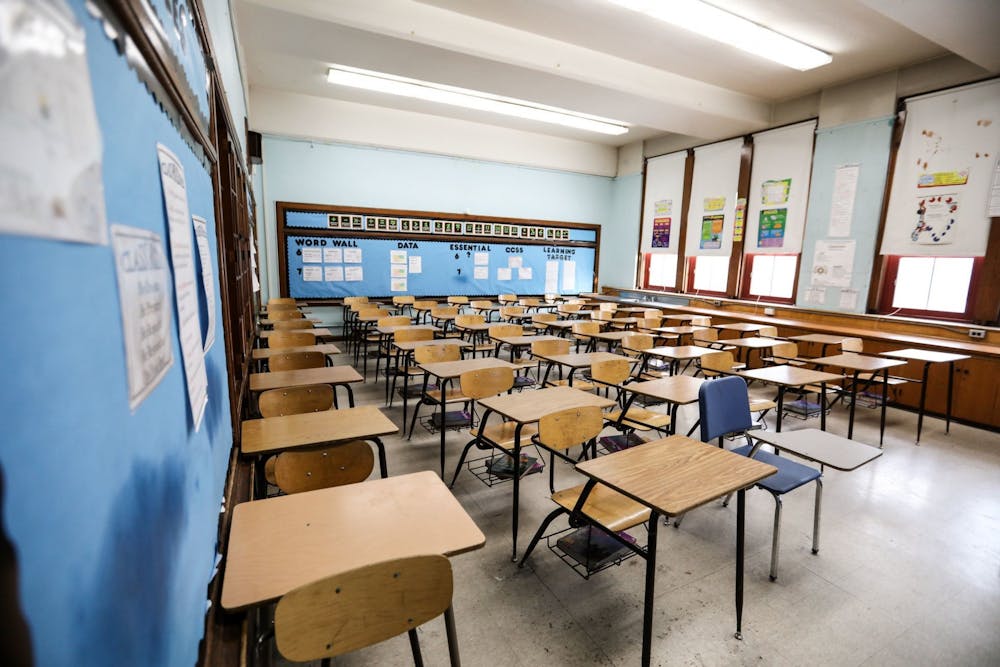In the middle of July, a 15-year old girl known as Grace, who attends Groves High School in Michigan, made national news. She was arrested for not completing her schoolwork once COVID-19 forced all schools to switch to a virtual format. Although it was a part of her probation terms, Gov. Whitmer, D-MI, had issued an executive order that would suspend the confinement of juveniles that violated their probation unless they posed a serious threat to the community. Like many Americans, Grace suffers from ADHD which made the transition to virtual education especially difficult.
This is just one instance that shows the need for change in the education system. The school-to-prison pipeline is an American phenomenon where children are more likely to become incarcerated as a result of zero tolerance policies that are upheld within schools. These policies can be detrimental since they disproportionately affect Black and brown students.
Zero tolerance policies originated in the late 1990's in response to school shootings. These policies would lead to the suspension or expulsion of a student for bringing a weapon to school or even for talking back to a teacher. These policies were meant to create safer spaces in schools, but they have not been shown to be effective and have fueled increasing suspension and expulsion rates.
There are several alarming statistics that demonstrate the racial bias of these policies. One being that white students are more likely to be disciplined for provable, documentable offenses while Black students are more likely to be disciplined for more subjective reasons. These policies also disproportionately affect lower income students as they are up to ten times more likely to drop out of school than those with greater financial security.
Students that are suspended or expelled for a discretionary violation are nearly three times more likely to be in contact with the juvenile justice system within the following year. Black students are also suspended and expelled three times more than white students, even though they do not misbehave at higher rates. In almost all 50 states, Black students are more likely to be arrested at school and make up 31% of school-related arrests.
By criminalizing simple offenses within schools, we only exacerbate the mental health crisis and mass incarceration of our nation. Becoming incarcerated during your adolescent years is associated with worse mental and physical health in adulthood. About 80% of these youth will also become reincarcerated as adults. An overwhelming majority of these youth when they are first incarcerated also have at least one psychiatric disorder and require medical attention.
Again, these trends disproportionately affect Black and brown people as 1 in 3 Black men and 1 in 6 hispanic men face a lifetime imprisonment risk compared to just 1 in 17 white men. It is clear that these policies are detrimental to our youth and our nation, so why are they continuously upheld?
What are the alternatives?
Many schools are looking into restorative justice practices to help mitigate the affect of zero tolerance policies. These policies are focusing on reducing suspension rates, which have a strong relationship with dropout and arrest rates. Additionally, these policies are focusing on how to create an equitable environment for marginalized students.
Our school system has to transform the way it views conflict, and it must develop relationships between students and faculty so that conflict can be worked through in a healthy way that benefits both parties. Students should be able to make mistakes and learn from them in a meaningful way. By prioritizing social and emotional development within schools, we can help promote confidence and empathy, while reinforcing healthy relationships.
It is important to recognize that COVID-19 did not create these issues as they were prevalent before. It only made them more visible to our nation. However, COVID-19 will make these challenges even more difficult as it has created even more barriers as a result of the virtual format that must be addressed as well.
We must continue to fight against these policies so more children like Grace do not get criminalized for things that many children can relate to. Everyone deserves to make mistakes and have the chance to learn and develop from them.






